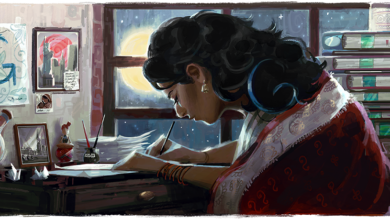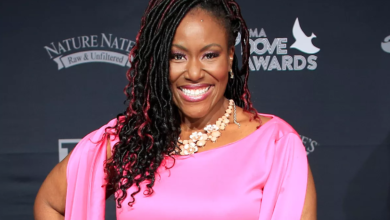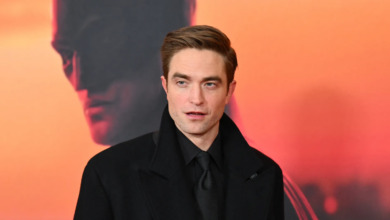Thunderbolts Review – Florence Pugh Shines as the Lone Star in Marvel’s Emotionally Charged Mess*
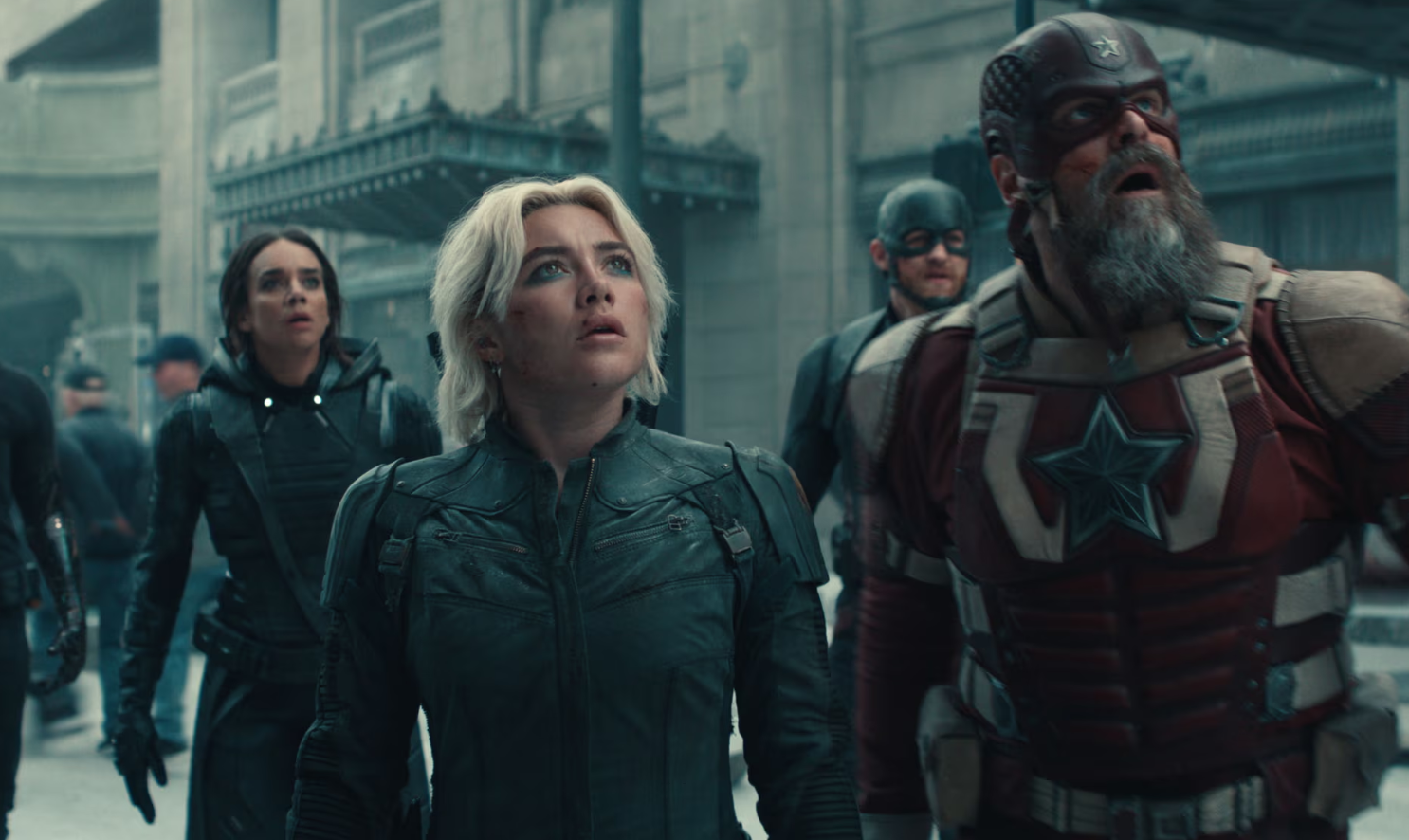
Marvel Studios has been swinging wildly these past few years, struggling to regain the electrifying magic that once defined the Marvel Cinematic Universe (MCU). After back-to-back misfires like The Marvels and the tumultuous reception of Captain America: Brave New World, it’s no surprise that expectations for the latest ensemble outing, Thunderbolts, were cautiously muted. But in typical Marvel fashion, there’s always a wildcard — and in this case, that wildcard is Florence Pugh.
Directed by Jake Schreier, Thunderbolts is a messy but unexpectedly compelling entry into the MCU canon — a tonal rollercoaster riddled with narrative whiplash, undercooked emotional arcs, and yet, flashes of brilliance that hint at something deeper. At its center, Pugh’s return as Yelena Belova, the sardonic sister of Scarlett Johansson‘s deceased Black Widow, holds the entire production together like cinematic glue. If Thunderbolts is Marvel’s latest gamble, Pugh is their ace.
A Team of Traumatized Antiheroes
For those unfamiliar with the Thunderbolts — and you’re forgiven, truly — this isn’t your polished Avengers lineup. These aren’t the world’s mightiest heroes, but rather a patchwork of emotionally broken, reluctant antiheroes scraped from the MCU’s forgotten corners. In the comics, the Thunderbolts were villains masquerading as heroes during the Avengers’ absence. In the film, they’re a ragtag crew cobbled together more in the style of DC’s Suicide Squad, brought in to do the government’s dirty work under the supervision of Valentina Allegra de Fontaine, played with delicious malice by Julia Louis-Dreyfus.
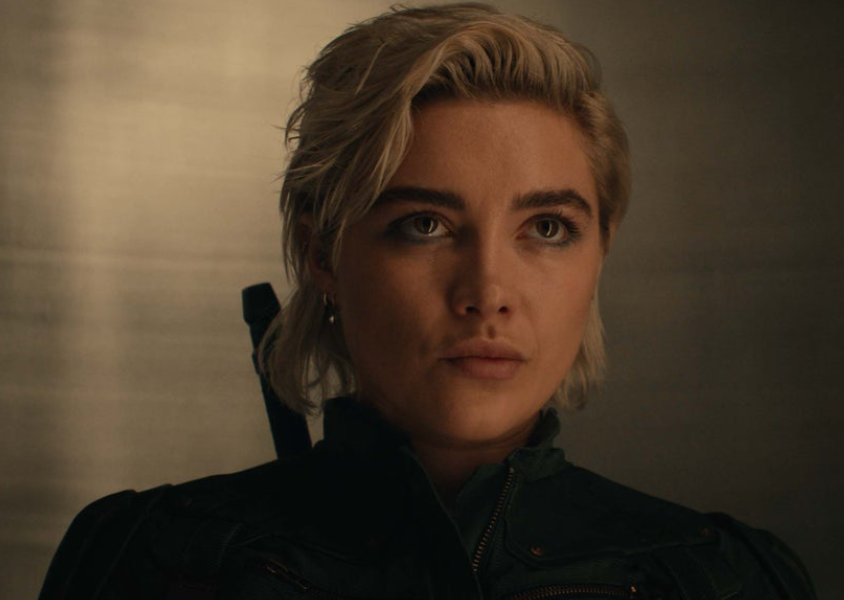
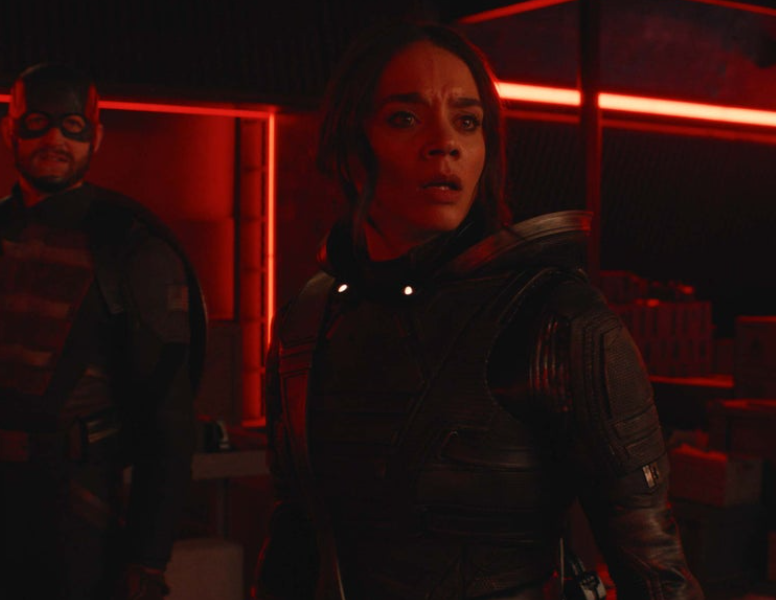
The lineup includes a few familiar faces:
- David Harbour returns as Alexei Shostakov, aka Red Guardian, still nursing a Soviet-sized inferiority complex while moonlighting as a limo driver.
- Wyatt Russell reprises his role as the disgraced John Walker, who brutally executed an unarmed insurgent in The Falcon and the Winter Soldier.
- Hannah John-Kamen is back as Ghost, the glitching antagonist from Ant-Man and the Wasp.
- And Sebastian Stan brings world-weary gravitas to Bucky Barnes, the ex-assassin struggling to maintain his redemption arc.
Each character wears their trauma like body armor, and the film isn’t shy about layering on the emotional baggage. Therapy would arguably be more helpful than a super-suit for these folks.
When Marvel Gets Weird, It Sometimes Works
To its credit, Thunderbolts dares to be emotionally messy. The screenplay by Eric Pearson, known for Black Widow and Thor: Ragnarok, leans into the characters’ psychological bruises. Yet the execution is often clumsy — dramatic scenes are frequently undercut by jarring tonal shifts or Marvel’s trademark quippy banter.
And yet, there’s something fascinating beneath the chaos. When Marvel lets go of its obsession with linear narratives and pristine hero arcs — as it did with WandaVision — it occasionally taps into something bordering on cinematic depth. Thunderbolts isn’t as daring as WandaVision, but it reaches for a similar rawness.
According to Pugh in an interview with Empire Magazine, the film borrows aesthetic and tonal cues from prestige indie studios like A24, which produced Pugh’s breakout horror drama Midsommar and Oscar-darling Everything Everywhere All At Once. The comparison isn’t empty. The action in Thunderbolts is stylized with an art-house sheen — slow shots, somber music cues, and disembodied camera angles that evoke emotion as much as spectacle.

A Visually Arresting Opening and Emotional Core
The film opens in Kuala Lumpur, where Yelena stands at the edge of the Merdeka 118, the second tallest building in the world. “There is something wrong with me,” she mutters before leaping off the ledge in a stunning sequence shot from overhead, showcasing acrobatic combat and emotional vulnerability in equal measure. She’s not suicidal — she’s on a mission to destroy evidence for de Fontaine, but the symbolism is potent. This is a woman who’s constantly teetering on the brink, both emotionally and physically.
Her internal monologue crackles with dry humor and self-loathing, a gallows wit that reflects Marvel’s best writing. While she fights enemies with balletic precision, her true opponent is herself — a theme echoed throughout the film’s dialogue and visuals.
Read More:
- Hunger Games: Sunrise on the Reaping Cast Revealed – Meet Joseph Zada as Haymitch and Whitney Peak as Lenore Dove
- Dilwale Dulhania Le Jayenge’s Unstoppable Legacy – A Statue, a Musical, and More!
- The Batman 2 Delayed: Warner Bros. Announces Significant Release Date Changes
The Wild Card: Bob and the Void
The team’s journey leads them to Bob, played by Lewis Pullman, a genetically modified human weapon plagued by emotional instability. His transformation into a monstrous entity called the Void — a shadowy, all-consuming force — gives Thunderbolts its climax. The final battle unfolds not in a CGI-smeared battlefield but in surreal, psychic spaces. Yelena dubs them “interconnected shame rooms,” a metaphor-rich concept that tries (not always successfully) to marry action and emotion.
If this sounds like Chronicle meets Everything Everywhere All At Once, you’re not far off. The climax is ambitious, if also disjointed. Director Jake Schreier, whose credits include music videos and the acclaimed indie Robot & Frank, clearly swings for the fences — but doesn’t always hit.
Mental Health Themes: Bold but Unearned
One of Thunderbolts’ most controversial elements will likely be its handling of mental health. Marvel flirts with meaningful commentary about PTSD, depression, and the impact of government manipulation. But much of it remains surface-level. Characters say they’re broken, cry a bit, and then move on. The themes are worn like costumes — visible, but not always lived-in.
This lack of depth undermines what could’ve been a revolutionary take on superhero storytelling. Marvel wants to be seen grappling with real emotions, but often lacks the courage to follow through. It’s theatrical vulnerability — not dishonest, but sanitized.
Florence Pugh: The MVP Marvel Desperately Needs
Still, what Thunderbolts lacks in thematic consistency, it makes up for in Florence Pugh. The 28-year-old actress continues to prove she’s one of the most talented performers of her generation. Her portrayal of Yelena is layered with pathos, sarcasm, and an aching vulnerability that never feels performative.
In one standout scene, she sits alone in a crumbling hideout, staring at a burned family photo. No words. Just breath, posture, eyes — and it’s one of the most emotionally resonant moments in the entire MCU. Pugh doesn’t need CGI to express superpowers; she’s a force of nature all her own.
Marvel’s Identity Crisis
As Marvel prepares for Phase Six and builds towards Avengers: Secret Wars, the studio seems caught between reinvention and nostalgia. Thunderbolts is emblematic of this tug-of-war — a film that wants to push boundaries but is afraid to let go of old formulas.
In this sense, it mirrors the characters it portrays: broken, uncertain, yet strangely compelling. There’s something admirable about Marvel admitting its heroes — and by extension, its brand — are in need of therapy.
Final Verdict: A Beautiful Mess Worth Watching
Thunderbolts isn’t the home run Marvel fans might be hoping for, but it’s an intriguing bunt that gets the runners moving. Its tonal inconsistencies, heavy-handed themes, and cluttered final act won’t work for everyone. But for those willing to embrace the mess, there’s value in the attempt.
Florence Pugh elevates every scene she’s in, Sebastian Stan and David Harbour inject weary charisma, and the film’s aesthetic ambition stands out amid Marvel’s increasingly formulaic fare. If this is the future of Marvel — rawer, riskier, and more emotionally ambitious — then it’s a direction worth exploring.
Rating: ★★★★☆ (4 out of 5)
Thunderbolts may not be perfect, but it’s a bold swing at something new, and Florence Pugh is the soul Marvel desperately needs.
Release Date: May 2, 2025 (US & UK)
Studio: Marvel Studios
Distributor: Walt Disney Studios Motion Pictures





